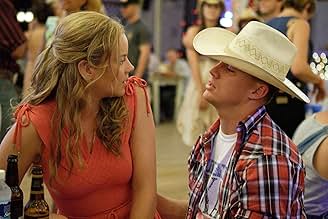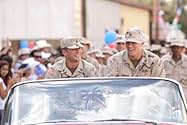IMDb-BEWERTUNG
6,4/10
21.277
IHRE BEWERTUNG
Nach seiner Rückkehr von einem Kriegseinsatz im Irak weigert sich ein Soldat, in den Kampf zurückzukehren, obwohl das Mandat die Regierung es von ihm verlangt.Nach seiner Rückkehr von einem Kriegseinsatz im Irak weigert sich ein Soldat, in den Kampf zurückzukehren, obwohl das Mandat die Regierung es von ihm verlangt.Nach seiner Rückkehr von einem Kriegseinsatz im Irak weigert sich ein Soldat, in den Kampf zurückzukehren, obwohl das Mandat die Regierung es von ihm verlangt.
- Regie
- Drehbuch
- Hauptbesetzung
- Auszeichnungen
- 2 Gewinne & 5 Nominierungen insgesamt
Connett Brewer
- Curtis
- (as Connett M. Brewer)
Empfohlene Bewertungen
Kimberly Peirce becomes one of the latest directors to try and only marginally succeed in making a compelling film about the Iraq conflict.
Peirce takes on as her subject the military's stop-loss clause, essentially a back door draft by which the military can use fine print in recruits' contracts to prevent them from getting out once their time is up. Peirce obviously feels strongly about the policy, but what should be a hard-hitting drama feels instead like a rather preachy after-school special. She coaxes a nice performance out of Ryan Phillipe, as the soldier who goes AWOL when his stop-loss clause is activated, but she doesn't fare as well with the rest of the cast. The film suffers from confusing editing, that doesn't always make it clear where characters are or how events are related to one another, and the writing at times is weak as well, with character motivations not coming across as clearly as they should.
I don't know what it is about the Iraq conflict that makes it so hard for filmmakers to make good movies about it. Maybe it will have to be over for a while before anyone can begin to approach it with any success.
Grade: B-
Peirce takes on as her subject the military's stop-loss clause, essentially a back door draft by which the military can use fine print in recruits' contracts to prevent them from getting out once their time is up. Peirce obviously feels strongly about the policy, but what should be a hard-hitting drama feels instead like a rather preachy after-school special. She coaxes a nice performance out of Ryan Phillipe, as the soldier who goes AWOL when his stop-loss clause is activated, but she doesn't fare as well with the rest of the cast. The film suffers from confusing editing, that doesn't always make it clear where characters are or how events are related to one another, and the writing at times is weak as well, with character motivations not coming across as clearly as they should.
I don't know what it is about the Iraq conflict that makes it so hard for filmmakers to make good movies about it. Maybe it will have to be over for a while before anyone can begin to approach it with any success.
Grade: B-
I really liked this movie. I wasn't looking for a bloody battle scene and there wasn't much of that expressed. Most of what was conveyed was the loss of friends in a situation that could happen to soldiers who march into harms way. Then the soldiers return home, back to the way things were? Their lives are not the same, and the people at home can't understand because they weren't there to see a friend die in their arms at the hands of some terrorist killers.
My brother just retired from the Army. He volunteered in Iraq for 1 year. He safely returned home, but his life had changed from that moment he was in Iraq. He said they lost a few young men, and another returned home severely burned from a cocktail thrown into the vehicle. At 130 degrees, how can they keep the windows closed in a military vehicle with the engine off. Two men that died were young (18 and 20). I feel the young soldiers have not received enough training and are too young to deal with the stress of war.
The movie had me thinking about the young men and women that barely have a year of training and next have RPGs hurling at them, roadside bombs, suicidal bombers walking into streets. How can anyone be trained to deal with that and be aware of it before it happens?
I commend the different positions on war in this movie: 1) Soldiers who are willing to die for their families and country. 2) Soldiers who have served their country and feel they should have the choice to step down from their jobs.
Stop-loss was something I never heard of until I saw the movie. How on earth can we say in the United States we have FREEDOM to choose if that privilege is removed when you enlist? It is like when you quit a job, move to another state, join a religion. FREEDOM to Choose! The Stop-Loss sanction nullifies the FREEDOM to step down after serving your country for 1 term or more. Do they think that will encourage people to sign up to serve in the armed forces if the contract removes their basic right of FREEDOM that we all hold so dearly. I was angry to hear soldiers are forced to return to serve multiple times. Many soldiers clearly need to stay home to recover and try to live a normal life instead of sending them back to die. It sounds as if these soldiers are no more than a body with a gun to send back into war.
I would recommend seeing this movie!
My brother just retired from the Army. He volunteered in Iraq for 1 year. He safely returned home, but his life had changed from that moment he was in Iraq. He said they lost a few young men, and another returned home severely burned from a cocktail thrown into the vehicle. At 130 degrees, how can they keep the windows closed in a military vehicle with the engine off. Two men that died were young (18 and 20). I feel the young soldiers have not received enough training and are too young to deal with the stress of war.
The movie had me thinking about the young men and women that barely have a year of training and next have RPGs hurling at them, roadside bombs, suicidal bombers walking into streets. How can anyone be trained to deal with that and be aware of it before it happens?
I commend the different positions on war in this movie: 1) Soldiers who are willing to die for their families and country. 2) Soldiers who have served their country and feel they should have the choice to step down from their jobs.
Stop-loss was something I never heard of until I saw the movie. How on earth can we say in the United States we have FREEDOM to choose if that privilege is removed when you enlist? It is like when you quit a job, move to another state, join a religion. FREEDOM to Choose! The Stop-Loss sanction nullifies the FREEDOM to step down after serving your country for 1 term or more. Do they think that will encourage people to sign up to serve in the armed forces if the contract removes their basic right of FREEDOM that we all hold so dearly. I was angry to hear soldiers are forced to return to serve multiple times. Many soldiers clearly need to stay home to recover and try to live a normal life instead of sending them back to die. It sounds as if these soldiers are no more than a body with a gun to send back into war.
I would recommend seeing this movie!
Maybe the idea was to show the total hopelessness of the conflict--that it was not really a war but urban warfare, and that there is no way to win or to have a happy ending. But that's just an idea--it's not a movie.
I thought that the set-up was fine. But I am not sure the filmmakers knew where to go with it. Their take on the stop-loss policy is obvious, and it is a message that should be heard. But I think the film would have been more interesting if any character exhibited any real growth during the film. The vets were all depicted as basket cases--the most well-adjusted vet seemed to be the double-amputee--he told us why he would want to go back to Iraq and there was at least some productive purpose that would have been served by his return there.
Perhaps there are soldiers who don't mind being stop-lossed--who truly believe they are accomplishing something positive over there. It would have been refreshing to have a character like that--a non-basket case. It would have been good to hear arguments supporting the stop-loss program (if there are any).
The last 20-30 minutes of this film were baffling. The end of the film (not an ending, just an end) was very unsatisfying.
Ryan Philippe did a competent job, but rarely conveyed anything not apparent from the lines or situation. For example, you could see that a lot of his post-war angst was attributable to guilt. How that tied in with the ending is just a mystery to me.
I recall that a very similar military policy was explored by Joseph Heller in Catch-22. I think a comparison to that novel and film is more apt than comparing this to The Deer Hunter.
I wish this film could have been much better than it was.
I thought that the set-up was fine. But I am not sure the filmmakers knew where to go with it. Their take on the stop-loss policy is obvious, and it is a message that should be heard. But I think the film would have been more interesting if any character exhibited any real growth during the film. The vets were all depicted as basket cases--the most well-adjusted vet seemed to be the double-amputee--he told us why he would want to go back to Iraq and there was at least some productive purpose that would have been served by his return there.
Perhaps there are soldiers who don't mind being stop-lossed--who truly believe they are accomplishing something positive over there. It would have been refreshing to have a character like that--a non-basket case. It would have been good to hear arguments supporting the stop-loss program (if there are any).
The last 20-30 minutes of this film were baffling. The end of the film (not an ending, just an end) was very unsatisfying.
Ryan Philippe did a competent job, but rarely conveyed anything not apparent from the lines or situation. For example, you could see that a lot of his post-war angst was attributable to guilt. How that tied in with the ending is just a mystery to me.
I recall that a very similar military policy was explored by Joseph Heller in Catch-22. I think a comparison to that novel and film is more apt than comparing this to The Deer Hunter.
I wish this film could have been much better than it was.
Just saw this film in an advance screening and once the tension and threat (very real) of the opening battle scenes were borne and past, the film grew on me, as the story became one of the soldiers at home: their war aftermath and their war that just won't quit or let them go.
It occurred to me at one point this was quite like watching a "Deer Hunter" for the Iraq war. There were certainly similar aspects, including aspects of the soldiers' relationships with each other and with others at home, and in terms of the casualties and injuries that continue to pile up well after leaving the battlefield.
Stop Loss is perhaps a more political film than the "Deer Hunter" was, because of the timing of its release, while the issues of the war in the film are still very much on the boil in the USA. I think it intends to position itself in a relevant and timely place, and time will tell whether it has staying power as a lasting and powerful war or antiwar film.
There is enough humanity, good drama and strong acting in this picture that it may deserve a place in the lineup of memorable or important American war films.
It occurred to me at one point this was quite like watching a "Deer Hunter" for the Iraq war. There were certainly similar aspects, including aspects of the soldiers' relationships with each other and with others at home, and in terms of the casualties and injuries that continue to pile up well after leaving the battlefield.
Stop Loss is perhaps a more political film than the "Deer Hunter" was, because of the timing of its release, while the issues of the war in the film are still very much on the boil in the USA. I think it intends to position itself in a relevant and timely place, and time will tell whether it has staying power as a lasting and powerful war or antiwar film.
There is enough humanity, good drama and strong acting in this picture that it may deserve a place in the lineup of memorable or important American war films.
'Stop-Loss' deals with the problems soldiers have in getting out of the army; both through the technical procedure of "Stop-Loss", whereby a solider is sent back for a second consecutive tour of duty, but also through the difficulties of adjusting to civilian life after time on the front line. Many dramas set after the Vietnam war explored the idea that the sense of a victory well won (absent then, as now) might be critical to enabling a soldier to make the transition from combat animal back to member of civic society. The film is well made, powerfully acted, and doesn't pretend that it's characters are angels (although it justly acknowledges their bravery). But it doesn't really go very far beyond its premise, and the ending is given a slightly more upbeat (but inconclusive) spin than could have been applied. The final credits remind us of the startling high number of American troops to have fought in Afghanistan or Iraq in the 21st century; wars that are fought (for good or bad) while the rest of us get on with our lives in an altogether easier place.
Wusstest du schon
- WissenswertesThe title refers to a provision in all military service contracts that says a service member can be involuntarily extended beyond their discharge (from active duty) date, and at times beyond their final discharge from service date, according to the needs of the service.
- PatzerWhen Sgt. King visits Rico, as he pushes his wheel chair out of the sun you can clearly see a bulge in Rico's t-shirt where his real arm is resting.
- Zitate
[from trailer]
Passport Issuer: Here's your new ID. If you go, you're gone for good.
- SoundtracksCourtesy of the Red, White and Blue (The Angry American)
Written by Toby Keith
Top-Auswahl
Melde dich zum Bewerten an und greife auf die Watchlist für personalisierte Empfehlungen zu.
Details
Box Office
- Budget
- 25.000.000 $ (geschätzt)
- Bruttoertrag in den USA und Kanada
- 10.915.744 $
- Eröffnungswochenende in den USA und in Kanada
- 4.555.117 $
- 30. März 2008
- Weltweiter Bruttoertrag
- 11.212.953 $
- Laufzeit
- 1 Std. 52 Min.(112 min)
- Farbe
- Sound-Mix
- Seitenverhältnis
- 1.85 : 1
Zu dieser Seite beitragen
Bearbeitung vorschlagen oder fehlenden Inhalt hinzufügen





































